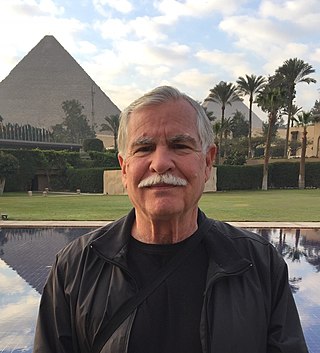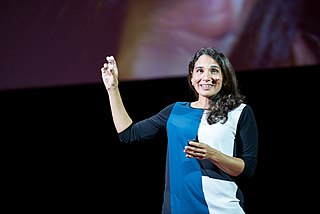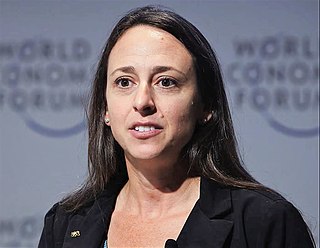Related Research Articles

MEMS is the technology of microscopic devices incorporating both electronic and moving parts. MEMS are made up of components between 1 and 100 micrometres in size,and MEMS devices generally range in size from 20 micrometres to a millimetre,although components arranged in arrays can be more than 1000 mm2. They usually consist of a central unit that processes data and several components that interact with the surroundings.
Microfabrication is the process of fabricating miniature structures of micrometre scales and smaller. Historically,the earliest microfabrication processes were used for integrated circuit fabrication,also known as "semiconductor manufacturing" or "semiconductor device fabrication". In the last two decades,microelectromechanical systems (MEMS),microsystems,micromachines and their subfields have re-used,adapted or extended microfabrication methods. These subfields include microfluidics/lab-on-a-chip,optical MEMS,RF MEMS,PowerMEMS,BioMEMS and their extension into nanoscale. The production of flat-panel displays and solar cells also uses similar techniques.

Carolyn Ruth Bertozzi is an American chemist and Nobel laureate,known for her wide-ranging work spanning both chemistry and biology. She coined the term "bioorthogonal chemistry" for chemical reactions compatible with living systems. Her recent efforts include synthesis of chemical tools to study cell surface sugars called glycans and how they affect diseases such as cancer,inflammation,and viral infections like COVID-19. At Stanford University,she holds the Anne T. and Robert M. Bass Professorship in the School of Humanities and Sciences. Bertozzi is also an Investigator at the Howard Hughes Medical Institute (HHMI) and is the former director of the Molecular Foundry,a nanoscience research center at Lawrence Berkeley National Laboratory.
Michelle C. Y. Chang is a Professor of Chemistry and Chemical and Biomolecular Engineering at the University of California,Berkeley,and is a recipient of several young scientist awards for her research in biosynthesis of biofuels and pharmaceuticals.
Christopher J. Chang is a professor of chemistry and of molecular and cell biology at the University of California,Berkeley,where he holds the Class of 1942 Chair. Chang is also a member of the Helen Wills Neuroscience Institute,a Howard Hughes Medical Institute investigator,adjunct professor of pharmaceutical chemistry at the University of California,San Francisco,and faculty scientist at the chemical sciences division of Lawrence Berkeley Lab. He is the recipient of several awards for his research in bioinorganic chemistry,molecular and chemical biology.
Mark G. Allen is a professor specializing in microfabrication,nanotechnology,and microelectromechanical systems at the University of Pennsylvania,where he is currently Alfred Fitler Moore Professor of Electrical and Systems Engineering Director of the Singh Center for Nanotechnology,and leader of the Microsensor and Microactuator Research Group. Prior to his joining the University of Pennsylvania in 2013,he was with the Georgia Institute of Technology,where he was Regents' Professor of Electrical and Computer Engineering and the J.M. Pettit Professor in Microelectronics. While at Georgia Tech,he also held multiple administrative positions,including Senior Vice Provost for Research and Innovation;Acting Director of the Georgia Electronic Design Center;and Inaugural Executive Director of Georgia Tech's Institute for Electronics and Nanotechnology. He was editor in chief of the Journal of Micromechanics and Microengineering (JMM),and currently serves on the editorial board of JMM as well as the journal Microsystems and Nanoengineering.

Richard Stephen Muller is an American professor in the Electrical Engineering and Computer Science Department of the University of California at Berkeley.

Kurt E. Petersen is an American inventor and entrepreneur. He is known primarily for his work on microelectromechanical systems. Petersen was elected a member of the United States National Academy of Engineering in 2001.

Roger Thomas Howe is the William E. Ayer Professor of Electrical Engineering at Stanford University. He earned a B.S. degree in physics from Harvey Mudd College and M.S. and Ph.D. degrees in electrical engineering from the University of California,Berkeley in 1981 and 1984,respectively. He was a faculty member at Carnegie-Mellon University from 1984-1985,at the Massachusetts Institute of Technology from 1985-1987,and at UC Berkeley between 1987-2005,where he was the Robert S. Pepper Distinguished Professor. He has been a faculty member of the School of Engineering at Stanford since 2005.
Ali Javey is a professor of electrical engineering and computer sciences at the University of California,Berkeley,a senior faculty scientist at the Lawrence Berkeley National Laboratory,and co-director of the Bay Area Photovoltaic Consortium and the Berkeley Sensor and Actuator Center. His research is focused on materials and device innovation for technological applications,particularly photovoltaics,wearable sensors,nanoelectronics,and programmable materials.

Reza Ghodssi is a Professor in the Department of Electrical and Computer Engineering and the Institute for Systems Research (ISR) at the University of Maryland,College Park,where he directs the MEMS Sensors and Actuators Lab and holds the Herbert Rabin Distinguished Chair in Engineering. Ghodssi is also the Inaugural Executive Director of Research and Innovation for the A. James Clark School of Engineering at the University System of Maryland at Southern Maryland (USMSM). He is best known for his work designing micro- and nano-devices for healthcare applications,particularly for systems requiring small-scale energy conversion and biological and chemical sensing.

Andrei M. Shkel is a Professor of Mechanical and Aerospace Engineering at the University of California,Irvine. He was named Fellow of the Institute of Electrical and Electronics Engineers (IEEE) in 2014 "for contributions to micromachined gyroscopes". He served as the President of the IEEE Sensors Council (2020-2021). In 2021,he was elected to National Academy of Inventors (NAI) Fellow status. He is currently the Editor-in-Chief of the IEEE Sensors Letters.

Rebecca Abergel is a professor of nuclear engineering and of chemistry at University of California,Berkeley. Abergel is also a senior faculty scientist in the chemical sciences division of Lawrence Berkeley National Laboratory,where she directs the Glenn T. Seaborg Center and leads the Heavy Element Chemistry research group. She is the recipient of several awards for her research in nuclear and inorganic chemistry.
Albert P. Pisano is an American academic. He serves as dean of the Jacobs School of Engineering at the University of California San Diego,a position he has held since September 2013. Pisano publishes a monthly Dean's column that introduces the monthly news email from the UC San Diego Jacobs School of Engineering. The January 2022 dean's column,"Math matters to all of us" triggered significant conversation on Pisano's LinkedIn feed.
Richard Manning White was an electrical engineer and a professor emeritus in the Department of Electrical Engineering and Computer Sciences at UC Berkeley and a Co-Founding Director of the Berkeley Sensor &Actuator Center (BSAC). He and Richard S. Muller founded the BSAC in 1986. They received 2013 IEEE/RSE James Clerk Maxwell Medal for pioneering innovation and leadership in MEMS technology. White is known for inventing the Interdigital Transducer (IDT) and for his surface acoustic wave work,he received the 2003 Rayleigh Award. He received the IEEE Cledo Brunetti Award in 1986.

Amy Elizabeth Herr is an American professor. She is the John D. and Catherine T. MacArthur Professor at the University of California,Berkeley,where she is attached to the Department of Bioengineering. At Berkeley she was also the founding executive director of the Bakar Bioenginuity Hub. Herr is a Chan Zuckerberg BioHub Investigator and the Chief Technology Officer of the Chan Zuckerberg Biohub Network,a fellow of both the National Academy of Inventors and the American Institute of Medical and Biological Engineering,as well as a co-founder of Zephyrus Biosciences,a biotechnology company that was acquired by Bio-Techne.

Niels Quack is a Swiss and German engineer specialized in optical micro engineering. He is a SNSF professor at EPFL and director of the Photonic Micro- and Nanosystems Laboratory at its school of engineering.
Beth L. Pruitt is an American engineer. Upon completing her master's degree in manufacturing systems engineering from Stanford University,Pruitt served as an officer in the United States Navy. She is a full professor of mechanical engineering,biological engineering,and biomolecular science &engineering at the University of California,Santa Barbara. She is a fellow of both ASME and AIMBE.
Yael Nemirovsky is an Israeli chemist and electrical engineer known for her research in microelectromechanical systems and microoptoelectromechanical systems. She is a professor emerita of electrical engineering at the Technion –Israel Institute of Technology.

Donald Lad DeVoe is an engineer recognized for his contributions to the fields of microelectromechanical systems (MEMS) and microfluidics. He is a Professor of Mechanical Engineering at the University of Maryland,College Park,where he serves as Associate Chair of Research and Administration in the Department of Mechanical Engineering. He is a Fischell Institute Fellow within the Robert E. Fischell Institute for Biomedical Devices,and holds affiliate faculty appointments in the Fischell Department of Bioengineering and Department of Chemical and Biomolecular Engineering at the University of Maryland.
References
- ↑ "Roya Maboudian | College of Chemistry". chemistry.berkeley.edu. Retrieved 2020-07-12.
- ↑ Maboudian, Roya (1989) In-Situ Observation of Surface and Near-Surface Modification Using Scattering of Ballistic Phonons. Dissertation (Ph.D.), California Institute of Technology.
- ↑ Maboudian, Roya (June 1998). "Adhesion and Friction Issues Associated With Reliable Operation of MEMS". MRS Bulletin. 23 (6): 47–51. doi:10.1557/S0883769400030633. ISSN 0883-7694. S2CID 138029796.
- ↑ "Miniature Sensors Can Detect Potential Dangers of CO2 | Research UC Berkeley". vcresearch.berkeley.edu. Retrieved 2020-07-12.
- ↑ "Newly elevated Fellow class 2021" (PDF). IEEE. Archived from the original (PDF) on December 6, 2020. Retrieved 2023-04-29.
- ↑ Sanders, Robert (2019-09-05). "Seven new Bakar Fellows already are making an impact". Berkeley News. Retrieved 2020-07-12.
- ↑ "02.10.99 -Three UC Berkeley researchers named outstanding young scientists by President Clinton". www.berkeley.edu. Retrieved 2020-07-12.
- ↑ "Roya Maboudian". Arnold and Mabel Beckman Foundation. Retrieved 2020-07-12.
- ↑ "Hellman Fellows » Roya Maboudian" . Retrieved 2020-07-12.
- ↑ Maboudian, Roya. "NSF Young Investigator: Surface Chemistry at Semiconductor Interfaces".
{{cite journal}}: Cite journal requires|journal=(help)